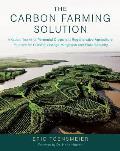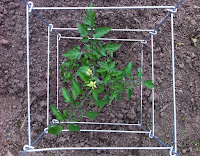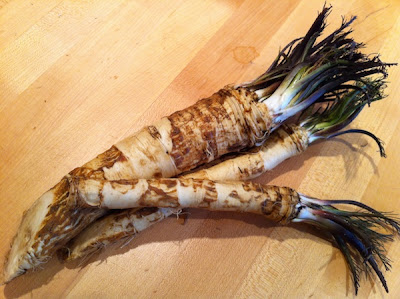Instead of fearing carbon, a Yale University lecturer is suggesting we farm it. In his recent book with the brain-numbing title
The Carbon Farming Solution: A Global Toolkit of Perennial Crops and Regenerative Agriculture Practices for Climate Change Mitigation and Food Security, author Eric Toensmeier describes a system of "carbon farming" that is being developed in Veracruz, Mexico.

In an article about the book on
GreenBiz.com, Toensmeier writes about an effort initiated by Ricardo Romero, a former cattleman who became concerned about the degradation of his pastureland from traditional ranching practices. He started a small cooperative called
Las Cañadas which is demonstrating that a combination of methods like planting native trees, reintroducing cattle—a technique called
silvopasture—as well as managed grazing, fodder banks and planting certain perennial crops, can feed people, build more fertile soils and contribute to ecosystem health without forcing communities to radically change their diets.
While not claiming that this is a turn-key solution to climate change, he posits that it is a step in the right direction and, if adopted globally along with a massive reduction in fossil fuel emissions, could contribute substantially to changing our current situation.
* * *
Before you toast the end of climate change as described above—it is, after all, just being modeled on a small scale—you might want to know that the herbicide glyphosate, the active ingredient in Monsanto's Roundup and recently declared a
"probable carcinogen" by the World Health Organization, has been found in random testing of 10 California wines.
A
study, initiated by the group Moms Across America after 14 brands of German beer were found to have traces of the herbicide, and described in an article in the
Digital Journal, found that that the wines, including some organic wines, had residues that exceeded the limit of .1 micrograms per liter allowed for drinking water.
"Using the Microbe Inotech Lab of St.Louis, Missouri…a total of 10 different wines from large and small vineyards in the Napa Valley, Sonoma and Mendocino counties in California were tested. According to the final report, the contamination of conventional wine was 28 times higher than organic wine."
The article goes on to state that "wine growers on conventional farms say that glyphosates are probably in the manure and/or fertilizers they use from animals fed genetically modified grains" and that "one big concern is for the folks who buy organic products, expecting to get what they are paying for." It says that the organic wine was probably contaminated by overspray, or "drift," from neighboring farms using the herbicide.
Cheers!
* * *
Efforts to ban neonicotinoid pesticides, the systemic neorotoxin linked to global bee die-offs, got a boost last week from the state of Maryland, according to an article in the
Washington Post. Governor Larry Hogan, a Republican, is expected to sign legislation passed by both houses of the state legislature to "ban stores from selling products laced with neonicotinoids to homeowners who tend to lather too much [of the pesticide] on trees and gardens."
Maryland's ban only applies to non-commercial uses of the pesticide, leaving "farmers and professionals who better understand how to apply them in a way that poses a lesser threat to bees…exempted by the law when it takes effect in 2018." Anyone who remembers the 2013
poisoning of more than 50,000 bees in Oregon by a commercial landscape company may disagree with this assumption.
Of this move by Maryland, Aimée Code of the
Xerces Society, a national organization that promotes invertebrate conservation, said, "This is a great step forward to curb the use of chemicals that are causing dramatic harm in the environment."
Last year the Portland City Council banned pesticides containing neonicotinoids on city-owned property despite heavy pressure from industry lobbyists, though the pesticide is still widely available from suppliers and nurseries for use by commercial companies and private individuals. Wholesale nurseries routinely apply it on bedding plants used in commercial landscaping and for home gardens.
Here in the Northwest, Code said that while large nurseries often sell plants that are bred to "look pretty" but are often treated with pesticides because they are more susceptible to pests, smaller nurseries stock more native plants that aren't as vulnerable to local pests. In a win-win for pollinators and gardeners, she said that "our native bees prefer native plants" because they have higher levels of the pollen and nectar the bees are seeking.
So when you're out shopping for plants for your gardens, ask your local garden center if the plants you're interested in were treated with neonicotinoids, and consider purchasing native plants. Our bees will thank you!
Photo of bumblebee by Beth Nakamura for the Oregonian.






























